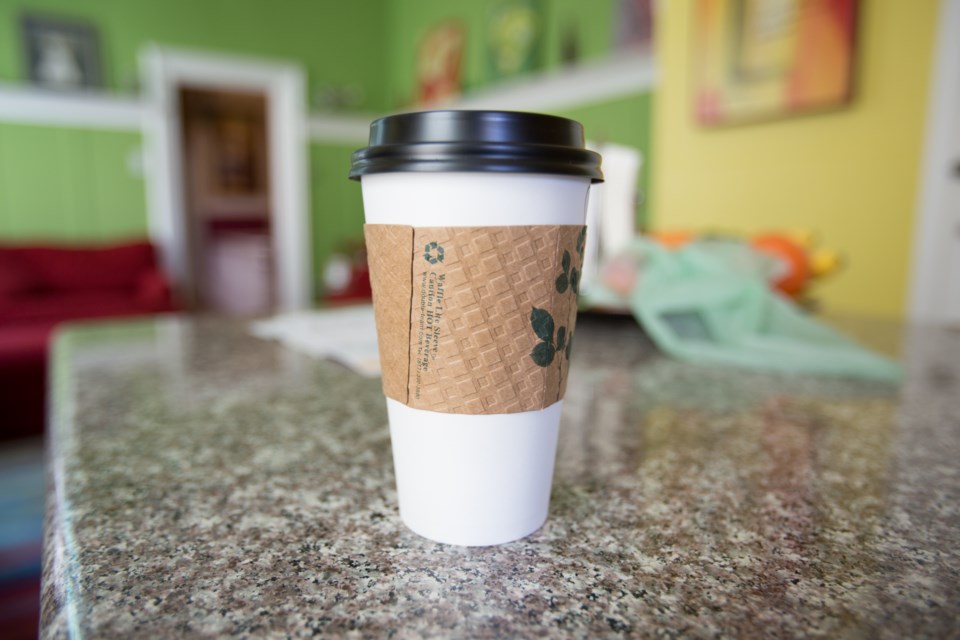The glorious sunshine on Family Day seemed to bring everybody outside.
I wound up in Grandview Park, whiling away the holiday afternoon with familiar friends and a familiar feeling in my hand: a disposable coffee cup.
For a long time now, I've been noticing, with mounting guilt, my commitment to the three Rs is in decline: I'm terrible at remembering reusable grocery bags (I don't have a car, so I can't stash them in there), my kitchen garbage receives a Styrofoam takeout container at least once a week, and, after a good decade of trucking my favourite reusable mug wherever I went, I have all but abandoned my trusty travel companion.
I am, in short, part of the problem; precisely the kind of person who requires the municipal action now under consideration at Vancouver city hall — a ban on plastic bags, Styrofoam food containers and disposable coffee cups. Given my behaviour, I wasn't surprised to learn from a staff report released last week that these items, despite their eligibility for recycling, are increasingly winding up in our public garbage bins, as well as putting a serious damper on our greenest city goals.
I was surprised to learn, however, that despite growing up with the threat of climate change hanging over our futures and our heads, my demographic — the 18-34 group — are some of the worst offenders.
Brock MacDonald, CEO of the Recycling Council of B.C. singled us out on CBC for our low participation in recycling programs. For instance, those in my age range, particularly males, are notoriously hard to rope into recycling beverage containers — and that's about as low a barrier to recycling as you get.
“Part of it is the lifestyle that young people lead,” MacDonald offered by way of explanation. We are always on the go, running from work to social obligations and back again. We often don't take, or make, the time to properly dispose of what we consume, despite well-established protocols. And that is the crux of this complex problem.
While the options city staff are considering to thwart the trash issue — deposit programs, mandating compostable containers, or an industry-backed take-back program — would undoubtedly help heathens like me to be more responsible, our culture of convenience, and consequently waste, won't go anywhere unless we learn to slow down.
We're just too busy. In many cases needlessly so, what with our constant checking of our phones and all. But regardless of why, we are steeped in a go-go-go culture that is engineered to contribute to the mounting problem of mounting trash.
On top of a ban, we need to figure out how to roll back the pace of a society that has too many people running around feeling like chickens without heads, unable to breathe, much less make a special trip to the recycling depot. But it is possible. There are examples of such utopias all over the world.
As I was cradling my Americano on the holiday Monday — and enjoying some rare downtime — I couldn't help but think back to a trip I took to South America nearly a decade ago. I distinctly remember debating whether to bring my aforementioned travel mug to the opposite end of the Earth. I did and it was a waste of space.
In South America, I learned, not every society is predicated upon people gulping great gallons of coffee to stay alert for marathon work sessions and scarfing fast-food in the car between relentless obligations.
I didn't need my travel mug in Argentina, or Chile, or Brazil, because in those countries, running around with a giant paper cup is simply not done. Rather, people take the concept of a coffee break to heart. They stop what they're doing to sit in cafes and sip their relatively diminutive espressos and cappuccinos before continuing on their way. In Buenos Aires — a city that otherwise should not serve as a model on waste disposal or recycling — it's not uncommon to see waiters weaving down the sidewalk carrying trays laden with real porcelain coffee sets on delivery runs for those in neighbouring offices.
Likewise, people tend to actually eat their food in restaurants rather than simply order it there, and, with an understanding that everybody needs some downtime at the end of the day, more people seemed to eat dinner at home.
When I think about what really stands in my way of making a more concerted effort to decrease my waste, it has little to do with knowledge or money or regulations, but a far more precious commodity: time. So while a ban on convenience items from our landfills is undoubtedly a good start, for it to truly make a dent, we may need more people to make a more concerted effort to chill out.
If only city hall could mandate that.
@jm_barrett



